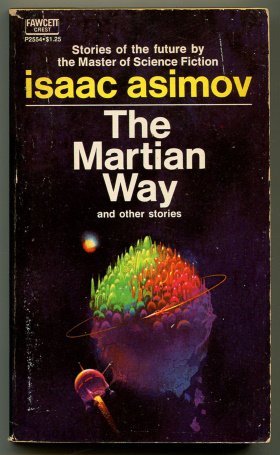Baker was jubilant. ‘Dr Ninheimer, it not only caught everything I caught – it found a dozen errors I missed! The whole thing took it twelve minutes!’
Ninheimer looked over the sheaf, with the neatly printed marks and symbols in the margins. He said, ‘It is not as complete as you and I would have made it. We should have entered an insert on Suzuki’s work on the neurological effects of low gravity.’
‘You mean his paper in Sociologi,cal Reviews?’
‘Of course.’
‘Well, you can’t expect impossibilities of Easy. It can’t read the litera- ture for us.’
‘I realize that. As a matter of fact, I have prepared the insert. I will see the machine and make certain it knows how to – uh – handle inserts.’
‘It will know.’
‘I prefer to make certain.’
Ninheimer had to make an appointment to see Easy, and then could get nothing better than fifteen minutes in the late evening.
But the fifteen minutes turned out to be ample. Robot EZ-27 understood the matter of inserts at once.
Ninheimer found himself uncomfortable at close quarters with the robot for the first time. Almost automatically, as though it were human, he found himself asking, ‘Are you happy with your work?’
‘Most happy, Professor Ninheimer,’ said Easy solemnly, the photocells that were its eyes gleaming their normal deep red.
‘You know me?’
‘From the fact that you present me with additional material to include in the galleys, it follows that you are the author. The author’s name, of course, is at the head of each sheet of galley proof.’
‘I see. You make – uh – deductions, then. Tell me – ’ He couldn’t resist the question – ’ What do you think of the book so far?’
Easy said, ‘I find it very pleasant to work with.’
‘Pleasant? That is an odd word for a – uh – a mechanism without emotion. I’ve been told you have no emotion.’
‘The words of your book go in accordance with my circuits,’ Easy explained. ‘They set up little or no counter-potentials. It is in my brainpaths to translate this mechanical fact into a word such as ‘pleasant.’ The emotional context is fortuitous.’
‘I see. Why do you find the book pleasant?’
‘It deals with human beings, Professor, and not with inorganic materials or mathematical symbols. Your book attempts to understand human beings and to help increase human happiness.’’
‘And this is what you try to do and so my book goes in accordance with your circuits? Is that it?’
‘That is it, Professor.’
The fifteen minutes were up. Ninheimer left and went to the university library, which was on the poin_t of closing. He kept them open long enough to find an elementary text on robotics. He took it home with him.
Except for occasional insertion of late material, the galleys went to Easy and from him to the publishers with little intervention from Ninheimer at first – and none at all later.
Baker said, a little uneasily, ‘It almost gives me a feeling of uselessness.’
‘It should give you a feeling of having time to begin a new project,’ said Ninheimer, without looking up from the notations he was making in the current issue of Social Science Abstracts.
‘I’m just not used to it. I keep worrying about the galleys. It’s silly, I know.’
‘It is.’
‘The other day I got a couple of sheets before Easy sent them off to—’
‘What!’ Ninheimer looked up, scowling. The copy of Abstracts slid shut. ‘Did you disturb the machine at its work?’
‘Only for a minute. Everything was all right. Oh, it changed one word. You referred to something as ‘criminal’; it changed the word to ‘reckless.’ It thought the second adjective fit in better with the context.’
Ninheimer grew thoughtful. ‘What did you think?’
‘You know, I agreed with it. I let it stand.’
Ninheimer turned in his swivel chair to face his young associate. ‘See here, I wish you wouldn’t do this again. If I am to use the machine, I wish the – uh – full advantage of it. If I am to use it and lose your – uh – services anyway because you supervise it when the whole point is that it requires no supervision, I gain nothing. Do you see?’
‘Yes, Dr Ninheimer,’ said Baker, subdued.
The advance copies of Social Tensions arrived in Dr Ninheimer’s office on the 8th of May. He looked through it briefly, flipping pages and pausing to read a paragraph here and there. Then he put his copies away.
As he explained later, he forgot about it. For eight years, he had worked at it, but now, and for months in the past, other interests had engaged him while Easy had taken the load of the book off his shoulders. He did not even think to donate the usual complimentary copy to the university library. Even Baker, who had thrown himself into work and had steered clear of the department head since receiving his rebuke at their last meeting, received no copy.
On the 16th of June that stage ended. Ninheimer received a phone call and stared at the image in the ‘plate with surprise.
‘Speidell! Are you in town?’
‘No, sir. I’m in Cleveland.’’ Speidell’s voice trembled with emotion. ‘Then why the call?’

























